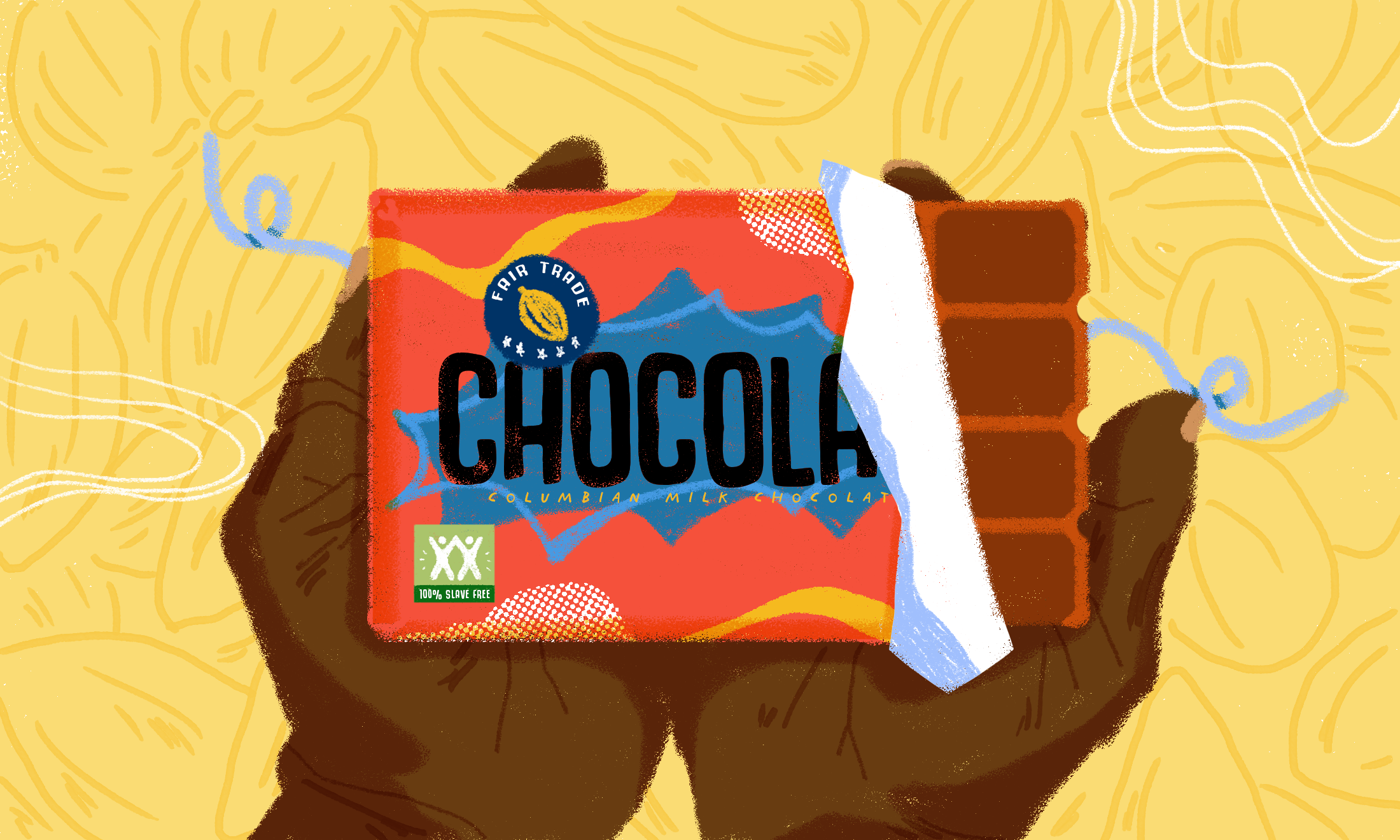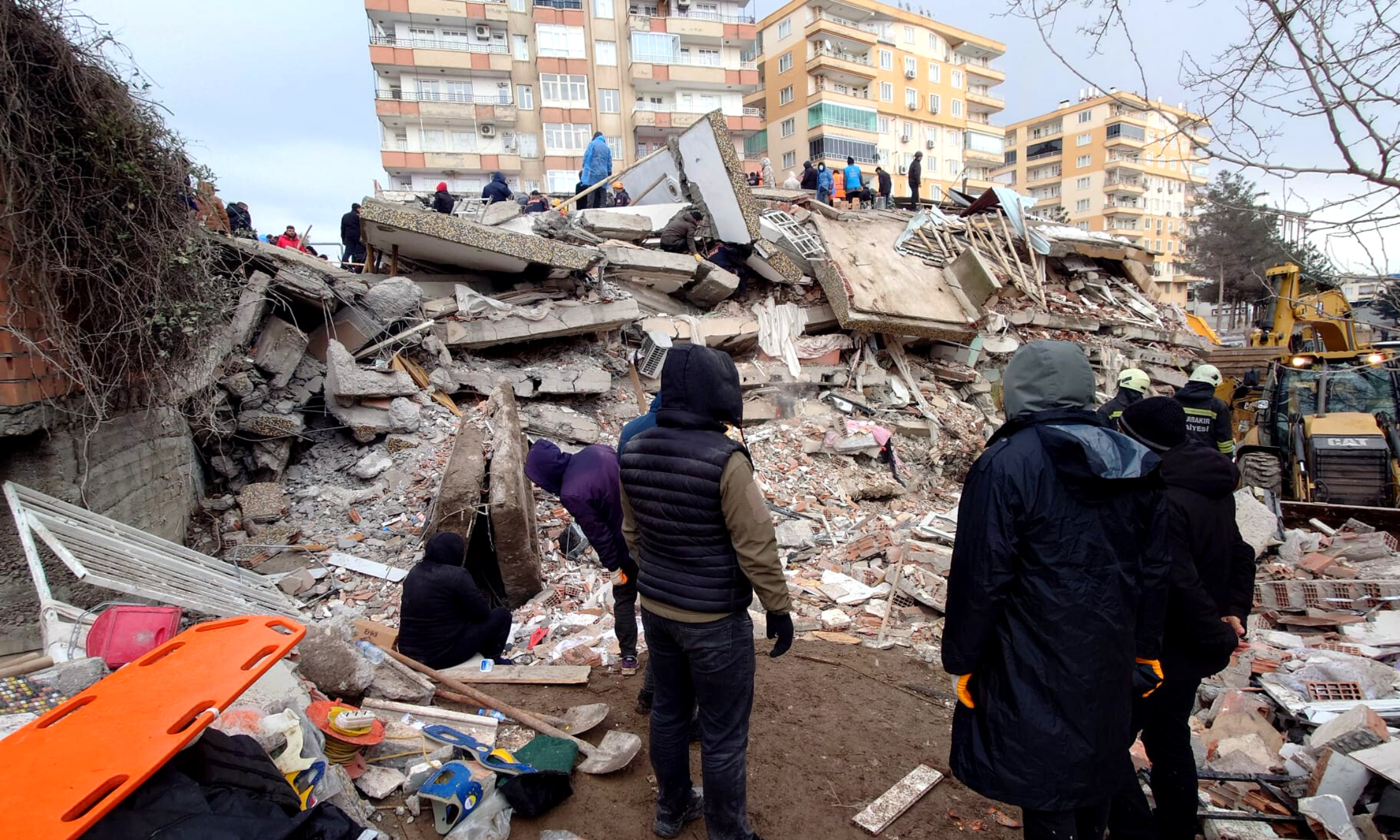
Illustration by Heedayah Lockman
The sweet new possibilities of bean-to-bar chocolate
It’s no secret the chocolate industry has a long history of exploitation, but a new wave of small-batch companies are prioritising farmers and creating alternatives to the confectionery giants.
Kareem Arthur
03 Mar 2022
In the south of Cameroon, about two hours outside the capital Yaoundé in the commune of Mengueme, sits a farm, home to Veronique and her family, the land has been in their family for generations, growing abundant crops, including plantains, taro, squashes, and the lucrative cocoa. Historically, cocoa farming is known to have a longstanding and complicated relationship with exploitation, yet that could all soon change.
A new wave of chocolate companies is looking to make a firm change in a landscape that has a complicated relationship with its farmers – the people crucial to the chocolate-making process. Companies like Bantu Chocolate in Cameroon, Askanya in Haiti and ‘57 chocolate, a bean-to-bar manufacturing company located in Ghana, could pose a viable alternative to the giant confectionary conglomerates.
An industry of exploitation, past and present
Cocoa trees flourish in hot and humid climates and have been coveted for their richness and complexities for several thousands of years. The waxy pods are plunged with deep ridges; and come in hues of orange, dark mahogany reds and golden yellows, usually picked from the tree by hand and then cut open to reveal the white fleshy raw bean.
The beans are left to ferment for up to just over a week and are then sun-dried, washed and roasted, leaving us with the finished product; ready to have their shells removed and broken into nibs or blended into a paste and turned into chocolate with the addition of milk and butter. It’s a time-consuming and labour-intensive process, requiring a strong hand and plenty of stamina. Today, the world’s largest exports of cocoa come from across the African continent, where two-thirds of the world’s commercial cocoa is processed.
In the late 1800s, due to Europe’s demand for cocoa, Portuguese investors made São Tomé and Príncipe in central Africa the home of cocoa farming globally, and the main source of cocoa for Britain’s chocolate makers including the Cadbury Brothers and Rowntree. Up until at least 1901, cocoa on these farms was harvested using slave labour. Only in 2020 did the Cadbury estates and trusts issue apologies for the origins of their wealth.
It’s not only historic exploitation that has ravaged the industry; modern inequalities persist. In 2019, the cocoa industry was estimated to be worth a huge $73 billion, with Côte d’Ivoire, Ghana, Cameroon and Nigeria comprising the top four countries for commercial cocoa processing and exports. But farmers in these countries are reaping little of the benefits, with some farmers receiving approximately less than 6.6% of the value of a single chocolate bar, while manufacturers and retailers in the US, Germany, Switzerland and Belgium receive the lion’s share.
Brands and labels in the West that proclaim to be ethical are still contributing to the overarching problems. Tony’s Chocolonely was removed from Slavefreechocolate.org’s ethical chocolate list and the company has said they cannot guarantee their chocolate is 100% slave-free.*
Growing change
In 2021 on a state visit to Switzerland, Ghana’s President Nana Akufo-Ado announced the end of the raw bean cacao trade between the two countries, based on the fact that although Ghana produces the main ingredient for one of the world’s most profitable products, Ghanaian cocoa farmers are not reaping the benefits. “We’re determined in Ghana, to ensure the succeeding generations of Ghanaians do not become victims or pawns of international economic order, but her beneficiaries,” he said.
It’s a sentiment echoed by sisters Priscilla Addison and Kimberly Addison, founders of ‘57 Chocolate, named after the year in which Ghana became the first country to gain independence. “’57 Chocolate’s passion is to inspire the people of Ghana, especially the youth to not be satisfied at merely selling and trading the country’s natural resources, but to add value and manufacture Ghanaian products of premium value,” they tell gal-dem via e-mail. “This is what ’57 stands for and this is what we are striving to do – bring manufacturing back to Ghana.”
Priscilla and Kimberly are examples of small-batch chocolate makers emerging to champion home-grown cacao while challenging the industry in the process. They’re keen to shake up longstanding injustices within the market; devoted to maintaining a safe, ethical and fair work environment across the supply chain. The benefits of small-batch chocolate go beyond ethics: the taste and quality of the chocolate is unique as there’s less pressure for farmers to use chemicals and pesticides, the beans are sorted by hand, and the specific roast and conch time (the process to mix and smooth chocolate) means that no two batches of chocolate are the same.
“Not so long ago we still had big virgin forests, that’s why it’s really important that we take care of the land”
Veronique
The beans from the Veronique’s family’s farm will be used to make Bantu Chocolate, the first bean-to-bar chocolate in Cameroon – meaning that once the beans are bought from the farmer they are not passed onto any other hands outside of the chocolate manufacturer until sold onto the consumer. “In Cameroon, our soil is really rich because it’s volcanic earth. Not so long ago we still had big virgin forests, that’s why it’s really important that we take care of the land,” Veronique says. She took inspiration for the brand’s name from the Bantu people and her own Cameroonian heritage. “When thinking of the name I went through many different things but I eventually thought well what am I? I am a woman and I am a Bantu,’’ Veronique explains.
When Veronique’s mother and step-father, who had lived in Normandy, France for many years where Veronique grew up, began to think about their retirement back to Cameroon in 2016, they were considering how best to use the family’s land back home. “At that time, Cameroon was trying to incentivise the community to grow more cocoa so they could have more cocoa to sell overseas,” says Veronique. Simultaneously, Veronique began researching the cocoa industry and became acutely aware of its injustices; prompting her to create Bantu Chocolate.
Bantu Chocolate’s bars, which is set to launch later this year will create flavours using ingredients that are native to West Africa. “I love cooking and I love different fusions, tastes and flavours,” says Veronique, mentioning one idea for a bar combining Cameroon pepper and an African green tea, similar to Japanese matcha.
Haitian chocolate company Askanya, co-founded by Corinne J.S Symietz who built the production house on the grounds of her grandparents’ house, is also keen to change perceptions and bring new ideas to chocolate-making.
“Farmers here don’t have big acres, they have what we call a tropical garden, where they grow a little cocoa, a little coffee, a little lime, a little orange”
Corinne J.S Symietz
Producing chocolate in Haiti comes with its challenges, Corinne explains, including limited electricity, as well as heat and shipping delays. However, Corrine’s mission is clear: “I wanted a business that would create revenue for Haitian farmers,” she says. “Farmers here are more like subsistence farmers. Farmers here don’t have big acres, they have what we call a tropical garden, where they grow a little cocoa, a little coffee, a little lime, a little orange, a little everything they need to eat and then whatever they don’t eat they will sell the rest to the market.”
Corrine wants to use the brand’s profits to provide schools and education for children in Haiti. She wants to encourage farmers to learn the steps taken after the beans are picked; fermenting, drying and roasting. When she first began her business, there were only a small number of farmers doing this part of the work, however, Corinne says this is growing and becoming more popular amongst the cocoa community in Haiti.
Beyond Fairtrade
What’s more, Fairtrade and other ‘ethical’ organisations and labels have come under scrutiny for working with big corporations known for unethical practices, upholding a system that continues to disadvantage countries in the Global South.
And what do Corinne and Veronique think about Fairtrade? While Corinne believes their goals and operatives are positive, she also says the expense of the certification is realistically too large for many small farmers. “The application fee is $15,000 [for some farmers]. How do you expect farmers to be able to afford $15,000 every year? First, they have to get the certification and then to maintain the certification.”
“Fairtrade is a corporation, they are the ones who probably benefit the most out of it,” Veronique agrees. “Because the little farmer who’s already struggling with his farm, who’s just had a bad rain season or something, still has to pay for inspection. Fees that are so expensive. How is it helping them?”
For Corrine, this is the reason she has never had her beans certified. Instead, she’s doing things a different way by building trust with her customers through the information she puts out, videos and reports hoping that they will still believe in her brand, which, so far, is paying off. There is also an option to go down the ‘organic’ route, but that too seems to add processes deemed too expensive for Corrine. “It’s a lot of hoops to jump through and as a small batch company with small finance, it wasn’t worth it for me.”
Although bad practices within cocoa processing still haunt the landscape, there are still people pushing for change and encouraging consumers to stop and think about what bars they buy. “You have to do the work,” says Veronique. “You have to be curious enough and you have to ask yourself questions.”
The article originally stated chocolate company Tony’s Chocolonely was alleged to be using cocoa farms with links to child slave labour, this has been amended on 10 March 2022 to reflect a statement from the company.
In an email to gal-dem, a spokesperson for Tony’s said: Tony’s calls any form of forced labour or exploitation of adults or children – including the worst forms of illegal child labour which are not acceptable under any circumstances – modern slavery. However, illegal child labour and modern slavery are not the same. Illegal child labour tends to be undertaken when the child is in the care of their parents. Child labour can occur in different levels of severity as is shown in the ILO table attached. Modern slavery involving children occurs when children are forced to work away from their family and do not have the option of stopping. Tony’s never found a case of modern slavery in its supply chain. The company does not claim that child labour does not exist in its supply chain and it does find instances of illegal child labour occurring on the cocoa farms where it source its beans. In fact, Tony’s transparently report on these figures in its annual FAIR report. Finding cases of child labour in your supply chain means you are taking responsibility and change is happening, which is reflected in the reduction in the prevalence of child labour at Tony’s long-term partner cooperatives. Tony’s has a Child Labour Monitoring and Remediation System (CLMRS) in place across all 7 cocoa cooperatives that they source from in Ghana and Ivory Coast. Last year Tony’s Chocolonely remediated 366 cases of child labour in 20/21, an increase of 67% vs last year.





